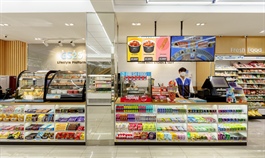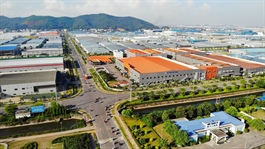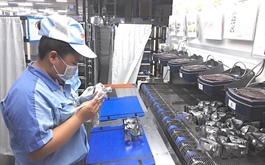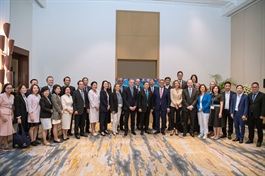Dairy segment showing off potential with fresh launches
Dairy segment showing off potential with fresh launches
Milk and other dairy products are emerging as a strong segment in the food and beverage industry, with an estimated average annual growth rate of over 12 per cent over the next few years.

FrieslandCampina, the group that owns the Dutch Lady dairy brand, has decided to choose Vietnam as the next destination in its strategy to expand FrieslandCampina Professional (FCP) food solutions in Asia.
For the launch, FCP decided to choose the Debic brand for its product lines of cream, butter, and cream cheese to introduce to millions of Vietnamese consumers.
Ta Thuy Ha, senior sales director of FrieslandCampina Vietnam, said that along with providing dairy products, the business also wants to provide knowledge and application of dairy ingredients in food and beverage processing.
“We hope that the presence of FCP will create excitement for the food and beverage (F&B) industry in Vietnam,” said Ha at the launch ceremony in Ho Chi Minh City last week.
FrieslandCampina is currently a provider of food solutions for well-known brands in the F&B sector such as Starbucks, Gloria Jean’s, Café Amazon, McDonald’s, Burger King, KFC, and Jollibee, as well as a number of hotel and restaurant chains such as Marriott International and Hilton Hotels.
FrieslandCampina is not the only enterprise in the industry that considers Vietnam as one of the key development markets.
Last month, Japanese dairy manufacturer Morinaga Milk Industry officially launched fat-free yogurt and nutritional drinks for middle-aged and elderly people in Vietnam. The group’s first strategy was to buy back shares of Elovi Vietnam JSC in June last year, in ordeer to be more proactive in the production and supply of products to the market.
Chihaya Takashi, general director of Elovi Vietnam said, “Morigana chose Vietnam as the first market to expand its business-to-consumer strategy outside of Japan because this is a market that is projected to have a stellar growth rate in the coming years. With the success achieved in the Japanese market, we are confident that the two new products will continue to develop strongly in Vietnam.”
Morinaga Milk Industry is an enterprise with 100 years of experience in developing dairy products in Japan. Under the long-term plan for the rest of the decade, the group aims to increase sales outside Japan by more than 15 per cent. In the Vietnamese market, the company’s goal is to achieve sales of around $73 million.
According to a market report published by Research and Markets in July, Vietnam’s dairy products industry has nearly doubled, from $4.4 billion in 2017 to $8.4 billion last year. The report estimates that by 2031, the industry will maintain a stable annual growth rate of about 12.4 per cent.
With a huge population with a growing sense of healthcare, experts predict that the demand for dairy products in Vietnam will continuously increase in the coming years. Of which, the yogurt market is expected to have an average annual growth rate of 8 per cent and the nutritional drinks market will grow at an average rate of 14 per cent per year, according to data compiled by Mizuho Bank in 2021.
In addition, the Vietnam Dairy Association notes that the average milk consumption per capita is 27 litres per year and is forecasted to continue to increase by 7-8 per cent annually.
With abundant potential, the Vietnamese market still has a lot of room for development as both domestic and foreign businesses come to seek new opportunities.
While Research and Markets estimates that there are around 200 dairy enterprises operating in Vietnam as of the end of 2021, the market is still dominated by large enterprises such as Vinamilk, Nestlé Vietnam, Nutifood, FrieslandCampina, and TH Group.
The report further evaluated, “Despite the increase in output, domestic fresh milk production only meets 40-50 per cent of domestic demand, while the rest mainly relies on imports.”
However, along with the advantages, Vietnam’s dairy product industry also faces challenges from the widespread sale of counterfeit goods, poor quality imitations, and dependence on the supply of raw materials from abroad.
To solve this problem, some businesses when expanding their operations in Vietnam, such as Morinaga Milk Industry, are building a sustainable development roadmap in the direction of actively developing raw material areas and building locally manufactured factories.
Chihaya Takashi, Elovi Vietnam general director, said that one of Morinaga’s two main products in the Vietnamese market is being manufactured at Elovi’s own factory in Thai Nguyen. In addition, the company also plans to disseminate information to Vietnamese consumers so that they can understand the differences in their products, minimising the purchase of poor quality products with brand labels, Takashi added.























